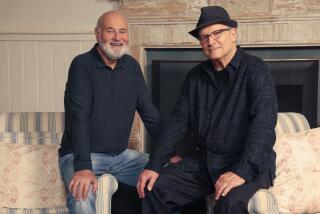Of wheelchairs and ‘wannabes’
Writer-director Carlos Brooks began conceptualizing his feature film debut, “Quid Pro Quo,” which opens Friday, some eight years ago.
“I wanted to write a different story, something unusual,” he explains. “I had an idea for somebody who was impaired in some way. He would get some sort of talisman that would help him overcome the impairment, and in return, I thought, he would have to help the person who impaired him in the first place.”
His initial idea, the filmmaker admits, didn’t tread water.
“The first outlines are really horrible, as you can image,” he says, laughing.
Then he realized that perhaps he didn’t feel as comfortable with “wheelchair culture, the culture of the disabled,” as he thought he did. So he set out one early morning on the Internet and began Googling that culture.
That’s when he learned about what he calls “wannabes” -- people who desire to be disabled.
“I never had heard about them before,” he says. “I just found they were online talking to each other. I thought it was fascinating the way they spoke to each other. They were aware of how they sounded, which is entirely different from saying something that most of us think is completely crazy.”
The world of these wannabes Brooks discovered was just what he needed to bring “Quid Pro Quo” to life.
Set in New York, the romantic drama-mystery-thriller revolves around Isaac Knott (Nick Stahl), a public radio reporter in New York who has been a wheelchair user since he was a boy, when an auto crash killed his parents and left him paralyzed. Vera Farmiga plays Fiona, a woman who is a wannabe and introduces him into this world.
Despite his fascination, Brooks says, he never talked to any wannabes.
“I perceived that these people might be living in some kind of inner, quiet torture,” he says. “Personally, I think by the nature of their condition, they want to be anonymous.”
-- Susan King
More to Read
Only good movies
Get the Indie Focus newsletter, Mark Olsen's weekly guide to the world of cinema.
You may occasionally receive promotional content from the Los Angeles Times.











